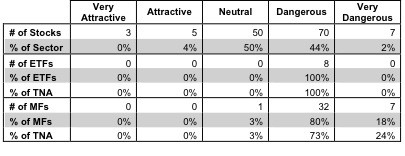Check out my latest Danger Zone interview with Chuck Jaffe of MarketWatch.com.
The utilities sector is in the Danger Zone this week.
Out of the 87 stocks we cover in the sector, only one gets and Attractive or better rating. The rest are rated Neutral (42), Dangerous (40) or Very Dangerous (4).
As dividend-yield-chasing investors have bid up the prices of utilities stocks, ETFs and funds, too many of them have overlooked the capital risk in those investments. My research shows that utilities stocks are meaningfully overbought. At some point, all the momentum driving up the prices of utilities stocks will stall and reverse. At which point, utilities investors could be facing major losses. I recommend investors do their diligence on all stocks, especially utilities in order to avoid the terrible downside that comes with making unsound investment decisions.
The utilities sector ranks ninth out of the ten sectors as detailed in my sector rankings for ETFs and mutual funds. Investors should not buy any utilities ETFs or mutual funds because none get an Attractive-or-better rating. If you must have exposure to this sector, you should buy a basket of Attractive-or-better rated stocks and avoid paying undeserved fund fees.
The figure shows that eight out of the 135 stocks (4% of the total net assets) held by utilities ETFs and mutual funds get an Attractive-or-better rating. However, none of the eight utilities ETFs or 40 utilities mutual funds get an Attractive-or-better rating. Note that utilities ETFs and mutual funds hold stocks that we do not classify as a utility. Hence, the 135 different stocks in these funds are greater than the 87 utilities we cover due to style drift. Unfortunately, only 7 of the additional 48 non-utilities stocks in the utilities funds get an Attractive or better rating.
The takeaways are: utilities mutual fund managers allocate too much capital to low-quality stocks and utilities ETFs hold poor quality stocks.
Figure: Utilities Sector Landscape For ETFs, Mutual Funds & Stocks
As detailed in “Cheap Funds Dupe Investors”, the fund industry offers many cheap funds but very few funds with high-quality stocks, or with what I call good portfolio management.
Per my 4Q report on the Best & Worst Utilities ETFs and Mutual funds, which is based on aggregation of ratings of eight ETFs and 40 mutual funds in the utilities sector as of October 11, 2012.
First Trust Utilities AlphaDEX Fund FXU is my top-rated Utilities ETF and earns my Dangerous rating. American Century Quantitative Equity Funds, Inc: Utilities Fund BULIX is my top-rated Utilities mutual fund and earns my Neutral rating.
Rydex S&P Equal Weight Utilities ETF RYU is my worst-rated Utilities ETF and earns my Dangerous rating. Rydex Series Funds: Utilities Fund RYUTX is my worst-rated Utilities mutual fund and earns my Very Dangerous rating.
Public Service Electric & Gas Company PEG is one of my favorite stocks held by Utilities ETFs and mutual funds and earns my Attractive rating. PEG is a rarity in the Utilities sector – it is in the only company in the Utilities sector to earn an Attractive-or-better rating, and is a business with positive economic earnings and a cheap valuation. PEG has generated a return on invested capital (ROIC) above its weighted average cost of capital (WACC) in five of the last six years. Its current stock price (~$32.48) implies the company’s after-tax profits (NOPAT) will permanently decline by 30%. The market is setting a low bar, and PEG has demonstrated that it can grow NOPAT.
Integrys Energy Group, Inc. TEG is one of my least favorite stocks held by Utilities ETFs and mutual funds and earns my Very Dangerous rating. TEG is a value destroyer that has generated negative economic earnings for all but one of the last 15 years. To justify its current stock price (~$55.29), TEG must increase profits by 9.5% compounded annually for the next 15 years. Growth like this is unlikely given the history of poor performance, a mature market, and the regulation faced by all Utilities.
Disclosure: I receive no compensation to write about any specific stock or theme.
© 2025 Benzinga.com. Benzinga does not provide investment advice. All rights reserved.
Trade confidently with insights and alerts from analyst ratings, free reports and breaking news that affects the stocks you care about.
